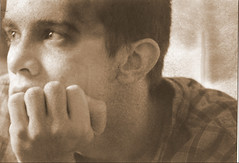Persona (1966)
One persona, one persona non grata...
Camera work alone propels the basis of this study of psychological escapism. Liv Ullman delivers an eerie actress who will not talk after freezing on stage -- a paralysis, it seems, that was brought on by the sudden impulse to laugh. With a script exercising its every right to pure minimalism and swaths of high-key lighting to give the images a ghosting, reality-bending quality, Persona deserves that attention be paid to its every detail, to every last word.
Bergman infuses bits of his own traumatic childhood into the film by encapsulating the story with the waking nightmare of a young boy. Haunted by elliptical dreams, the boy sits up in bed and tries to focus on the face projected on the wall in front of him. He reaches for the image, perhaps trying to bring it into focus, but the face keeps changing. In the tradition of pure study, the director invites us to wonder, but at no time are we allowed to feel sorry for any of the characters involved.
Bergman jumps right in. Sister Alma (Bibi Andersson) takes the dumb-struck Mrs. Vogel under her wing immediately. The hospice supervisor explains the actress' need for silence and at her suggestion patient and nurse go to her summer house on the shore to get away while Mrs. Vogel awaits a time she'll feel like speaking again. Before long, the nurse has begun to spill secrets that had been kept in too long and shares a fast intimacy with her ward. A genuine bond develops seemingly overnight by breaking the silence. Doubt soon gives way to anger, though, when she discovers a letter in which the actress purports to be studying her nurse. Livid, Alma confronts the actress and demands that she speak; threatening her with scalding water brings her out of her acute belligerence.
What follows deals with the brain's tendency to trick itself into seeing things that don't exist, and the effort required to correct the detouring process. He sheds a harsh light on this particular subject matter, not allowing much leeway for spiritual concerns to take precedence over logic, even though not everything in life can be explained. What Bergman seems most interested in toying with is the idea of an identity crisis as a source of inexplicable superiority over the life and life choices of a growing boy. If anybody in the film were to be considered sympathetic, it would be the boy, but Bergman doesn't seem to want to make himself (or even the most distant projection of his boyhood) pitiable onscreen, no matter how many times his parents locked him in a closet over dogma.
The film cruxes while Alma and Mrs. Vogel sit opposite one another at a table and Alma painstakingly recounts the intimate events of her patient's pregnancy and delivery. The scene is shot twice so that Liv can react to the dialogue in a close shot and then the nurse can be viewed repeating the same lines in a similar shot. The sense of the thing becomes clearer when Mr. Vogel shows up and spoils it: there is only one woman at the seaside cottage. What can then perceived are the final death throes of a debilitating facade that must go away before a real equilibrium can be restored.
Camera work alone propels the basis of this study of psychological escapism. Liv Ullman delivers an eerie actress who will not talk after freezing on stage -- a paralysis, it seems, that was brought on by the sudden impulse to laugh. With a script exercising its every right to pure minimalism and swaths of high-key lighting to give the images a ghosting, reality-bending quality, Persona deserves that attention be paid to its every detail, to every last word.
Bergman infuses bits of his own traumatic childhood into the film by encapsulating the story with the waking nightmare of a young boy. Haunted by elliptical dreams, the boy sits up in bed and tries to focus on the face projected on the wall in front of him. He reaches for the image, perhaps trying to bring it into focus, but the face keeps changing. In the tradition of pure study, the director invites us to wonder, but at no time are we allowed to feel sorry for any of the characters involved.
Bergman jumps right in. Sister Alma (Bibi Andersson) takes the dumb-struck Mrs. Vogel under her wing immediately. The hospice supervisor explains the actress' need for silence and at her suggestion patient and nurse go to her summer house on the shore to get away while Mrs. Vogel awaits a time she'll feel like speaking again. Before long, the nurse has begun to spill secrets that had been kept in too long and shares a fast intimacy with her ward. A genuine bond develops seemingly overnight by breaking the silence. Doubt soon gives way to anger, though, when she discovers a letter in which the actress purports to be studying her nurse. Livid, Alma confronts the actress and demands that she speak; threatening her with scalding water brings her out of her acute belligerence.
What follows deals with the brain's tendency to trick itself into seeing things that don't exist, and the effort required to correct the detouring process. He sheds a harsh light on this particular subject matter, not allowing much leeway for spiritual concerns to take precedence over logic, even though not everything in life can be explained. What Bergman seems most interested in toying with is the idea of an identity crisis as a source of inexplicable superiority over the life and life choices of a growing boy. If anybody in the film were to be considered sympathetic, it would be the boy, but Bergman doesn't seem to want to make himself (or even the most distant projection of his boyhood) pitiable onscreen, no matter how many times his parents locked him in a closet over dogma.
The film cruxes while Alma and Mrs. Vogel sit opposite one another at a table and Alma painstakingly recounts the intimate events of her patient's pregnancy and delivery. The scene is shot twice so that Liv can react to the dialogue in a close shot and then the nurse can be viewed repeating the same lines in a similar shot. The sense of the thing becomes clearer when Mr. Vogel shows up and spoils it: there is only one woman at the seaside cottage. What can then perceived are the final death throes of a debilitating facade that must go away before a real equilibrium can be restored.














0 Comments:
Post a Comment
<< Home